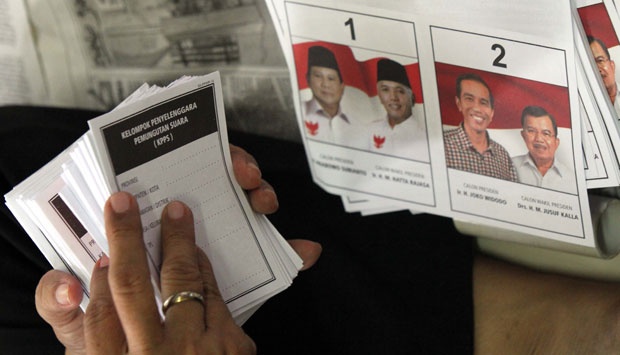Trashing the Vote
Translator
Editor
Selasa, 8 Juli 2014 18:24 WIB

TEMPO.CO, Jakarta - As chairman of the Democrat Party, Susilo Bambang Yudhoyono is entirely free to take a non-neutral position in the 2014 presidential election. His gestures and the way he issued instructions when he received Prabowo Subianto and Hatta Rajasa last Friday were a sign of his blessings for the two candidates. The meeting, broadcast live by several supportive television stations, ended with both kissing each other on the cheeks. Everyone understood that this was clearly an endorsement from Yudhoyono.
Perhaps he was not being consistent: previously he had stated that the Democrat Party was neutral. The decision was reached based on the wishes of party managers, whose opinions were polled. But the Democrat Party executive director, Syarif Hasan, subsequently declared the party's support for the Prabowo-Hatta ticket.
Yudhoyono may have his reasons for eventually taking sides. The continuation of his policies, political positions in the new administration and the safety of himself and his family under a new government he holds 'stakes' in are several possible reasons. But once again, as party chairman, he has every right to take his party in whatever direction he wants.
But Yudhoyono is not just a party chairman. He is also head of state, head of the government and supreme commander of the Indonesian military. On Wednesday's presidential election, the state he leads will have to act as a fair referee. If Yudhoyono can set a good example, all the of the state apparatus will follow suit.
What is happening on the ground, however, is that officials are openly supporting the candidate No. 1 on the ballot papers. About 70 percent of the regional chief executives have joined the Prabowo camp. Therefore it makes sense that regional governments will have deployed their forces to work for a Prabowo-Hatta victory.
In Karanganyar, Central Java, for example, Regent Juliyatmono has been busy handing out Rp1 million incentives to the heads of neighborhood associations (RTs). Although there is no urgency the Idul Fitri holiday is still a long way off according to Juliyatmono, the money is being disbursed to use up the budget. This Santa Claus behavior by the regent who is also the chairman of the Karanganyar Golkar Party should trigger suspicions that the money is being handed out to ensure a Prabowo-Hatta victory.
We still remember the fuss caused by the village control NCOs (babinsa) in Jakarta who questioned voters in order to map out support for Prabowo-Hatta. After complaints from the public the people responsible were punished. But after that case was resolved, another appeared. In Sumbawa, East Nusa Tenggara, it emerged that the babinsa were directing locals to vote for Prabowo.
Intervention let alone intimidation by soldiers clearly damages the stance of the Indonesian Military (TNI), which has maintained a neutral position since the start of the reform era. These actions should be punished accordingly. It does not only concern the TNI and the National Police. The neutrality of groups organizing the election, such as the General Elections Commission (KPU) and the Elections Supervisory Agency (Bawaslu) must also be protected. As referees, they should be free from the interests of any of the candidates contesting the poll.
The bureaucracy, both on an individual level and as administrators of the state, must not be disrupted. Individually, members have political rights. But as servants of the state, they must renounce some of these rights for example the right to participate in campaigns or to promote the candidates they support. This limitation of political rights is laid down in law to prevent conflicts of interest. Biased officials could easily be tempted to misuse state funding and facilities. Therefore, the use of state facilities in the interest of certain groups must be labeled corruption and action taken against it.
The New Order regime applied the principle of monolithic loyalty to civil servants. This meant that every state official was obliged to be loyal only to Golkar the party established by the government in a multiparty system that was not democratic. At that time, civil servants were Golkar officials: they supported the party, wore its uniform and had to ensure its victory in every election. It is not known how much in state funds collected from people's taxes was used to pay for the party. Those who rebelled were sidelined or had their careers put on hold.
The regime changed, but now we could be returning back to this dark period. Partiality by state officials, however late, must be stopped immediately. Reforms were achieved at a high price. Yudhoyono should set an example to his subordinates and act against those who break the rules, unless he wants to be remembered as a head of state who wrecked the objectives of reform at the end of his term of office. (*)
Read the full story in this week's edition of Tempo English Magazine




















